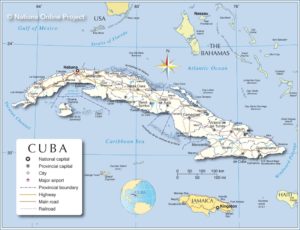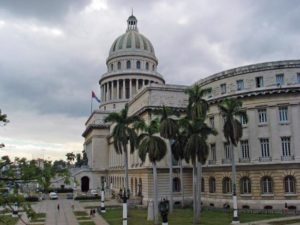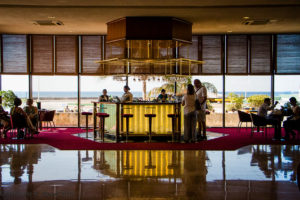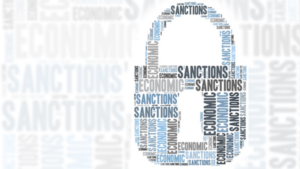 ESTADOS UNIDOS ESTUDIA SANCIONAR A EJECUTIVOS DE COMPAÑIAS CON NEGOCIOS EN CUBA.
ESTADOS UNIDOS ESTUDIA SANCIONAR A EJECUTIVOS DE COMPAÑIAS CON NEGOCIOS EN CUBA.
La administración de Donald Trump tiene en proceso más de 12 investigaciones sobre compañías extranjeras que trafican con propiedades confiscadas en Cuba y cuyos ejecutivos podrían verse impedidos de entrar a Estados Unidos en cumplimiento de la Ley Helms-Burton, confirmaron fuentes gubernamentales a la pagina Web CiberCuba.
El Departamento de Estado se encuentra actualmente analizado la elegibilidad para visados de representantes de compañías que se benefician de propiedades certificadas por la Comisión de Adjudicación de Reclamos Extranjeros del Departamento de Justicia, y que estarían sujetos a sanciones bajo el Título IV de la Helms-Burton.
“El Departamento de Estado tiene más de una docena de investigaciones activas del Título IV, pero no revelamos los temas de las investigaciones pendientes o completadas”, dijo un alto funcionario de la Oficina de Asuntos Hemisféricos del Departamento de Estado a CiberCuba.
El Título IV de la controversial legislación estadounidense fue activado el 2 de mayo de 2019, y permite prohibir la entrada a Estados Unidos a las personas que se beneficien del uso de propiedades incautadas por el gobierno cubano, con independencia de si la firma extranjera está sujeta a demandas ante tribunales estadounidenses. Un total de 5,913 fueron certificadas por los reclamantes estadounidenses, incluyendo expropiados cubanoamericanos, hasta 1974.
“Debido a los requisitos de confidencialidad de los visados, no podemos identificar a las personas cuyos visados y elegibilidad para obtenerlos se han visto o pueden verse afectados por el Título IV”, agregó el funcionario.
Aunque el Departamento de Estado ha puesto en la mirilla inmediata a compañías foráneas con litigios entablados en los tribunales federales bajo el Título III de la Ley Helms-Burton, las sanciones comprendidas bajo el Título IV se restringen exclusivamente a que la firma se vincule con una propiedad inscrita en el registro oficial de reclamaciones del Departamento de Justicia.
“Las sanciones a los ejecutivos de empresas que están registradas ante la Comisión de Adjudicación de Reclamos Extranjeros puede ampliarse a miles de firmas, aunque no hayan sido demandadas”, explicó a CiberCuba John Kavulich, presidente del Consejo Económico y Comercial Cuba-EEUU (USCTEC), con sede en Nueva York.
Kavulich especificó que no importa que la firma extranjera haya sido eximida de una demanda interpuesta por los legítimos dueños, o si se produce un acuerdo entre las partes litigantes en el caso. El pasado enero, Meliá fue excluida incluso de una demanda colectiva interpuesta por la familia Mata, ex propietaria del Hotel San Carlos, en la ciudad de Cienfuegos.
“Podemos esperar muchos ejecutivos impedidos de entrar a Estados Unidos en los próximos meses”, pronosticó el directivo de USCTEC.
Se calcula que las sanciones aplicadas en virtud del Título IV de la Ley Helms-Burton podría llegar en los próximos meses al centenar de ejecutivos, cuyos cónyuges e hijos tampoco podrían tener acceso a visitar Estados Unidos.
Un total de 21 demandas, a cargo de 35 firmas legales, han sido presentadas en tribunales de Estados Unidos tras la validación de los títulos III y IV de la Ley Helms-Burton el pasado año. De ellas, solo seis afectan a compañías foráneas: las hoteleras españolas Melía y NH Hotel Group y sus subsidiarias; los bancos BBVA (España) y Société Générale (Francia), y los turoperadores Booking.com (Holanda) y Trivago (Alemania).
La Unión Europea considera que la legislación estadounidense, aprobada en 1996, tiene un carácter extraterritorial y ha manifestado que podría llevar a Estados Unidos ante la Organización Mundial de Comercio o aplicar sanciones de represalia para proteger las compañías con presencia en Cuba.
* EN UN CABLE de ultima hora da a conocer que el gobierno de Estados Unidos reiteró sus amenazas con la negativa de entrada al país a empresarios de España que mantienen vínculos comerciales con Cuba, al amparo del Título III de la Ley Helms-Burton, que fue difundida por la revista Preferente.
Según la publicación, directivos de más de medio centenar de empresas con intereses en Cuba recibieron cartas firmadas por el Departamento norteamericano de Estado con la prohibición de acceso al territorio estadounidense, aún cuando alguno posea establecimientos en los Estados Unidos.
 UNITED STATES STUDIES TO SANCTION COMPANY EXECUTIVES WITH BUSINESS IN CUBA.
UNITED STATES STUDIES TO SANCTION COMPANY EXECUTIVES WITH BUSINESS IN CUBA.
The Donald Trump administration has more than 12 investigations into foreign companies dealing with property confiscated in Cuba and whose executives could be prevented from entering the United States in compliance with the Helms-Burton Act, government sources confirmed on the CiberCuba website.
The State Department is currently analyzing the visa eligibility of representatives of companies that benefit from properties certified by the Department of Justice’s Allocation of Foreign Claims, and that would be subject to sanctions under Title IV of the Helms-Burton.
“The State Department has more than a dozen active Title IV investigations, but we do not disclose the issues of pending or completed investigations,” a senior official from the State Department Office of Hemispheric Affairs told CiberCuba.
Title IV of the controversial US legislation was activated on May 2, 2019, and allows people who benefit from the use of property seized by the Cuban government to be banned from the United States, regardless of whether the foreign firm is subject to lawsuits before US courts. A total of 5,913 were certified by US claimants, including expropriated Cuban-Americans, until 1974.
“Due to visa confidentiality requirements, we cannot identify people whose visas and eligibility to obtain them have been seen or may be affected by Title IV,” the official added.
Although the State Department has immediately placed foreign companies with litigation filed in federal courts under Title III of the Helms-Burton Act, the penalties under Title IV are restricted solely to the signature of the firm being linked to property registered in the official claims registry of the Department of Justice.
“The penalties for executives of companies that are registered with the Commission for the Award of Foreign Claims can be extended to thousands of firms, even if they have not been sued,” John Kavulich, president of the Cuba-US Economic and Commercial Council (USCTEC) told CiberCuba. ), based in New York.
Kavulich specified that it does not matter that the foreign firm has been exempted from a lawsuit filed by the rightful owners, or if an agreement between the litigating parties occurs in the case. Last January, Meliá was excluded even from a class-action lawsuit filed by the Mata family, former owner of Hotel San Carlos, in the city of Cienfuegos.
“We can expect many executives prevented from entering the United States in the coming months,” the USCTEC director predicted.
It is estimated that the sanctions applied under Title IV of the Helms-Burton Act could arrive in the next few months by one hundred executives, whose spouses and children could not have access to visit the United States.
A total of 21 lawsuits, in charge of 35 legal firms, have been filed in US courts after the validation of titles III and IV of the Helms-Burton Act last year. Of these, only six affect foreign companies: Spanish hotel companies Melía and NH Hotel Group and its subsidiaries; BBVA banks (Spain) and Société Générale (France), and tour operators Booking.com (Holland) and Trivago (Germany).
The European Union considers that US legislation, passed in 1996, has an extraterritorial nature and has stated that it could take the United States to the World Trade Organization or apply retaliatory sanctions to protect companies with a presence in Cuba.
* IN A LAST-MINUTE cable announced that the United States government reiterated its threats with the refusal to enter the country to businessmen from Spain who maintain commercial ties with Cuba, under Title III of the Helms-Burton Act, which was disseminated by the Preferencia magazine.
According to the publication, executives from more than fifty companies with interests in Cuba received letters signed by the US Department of State with the prohibition of access to the US territory, even if some have establishments in U.S.
Agencies/ CiberCuba/ Internet Photos/ Extractos/ Excerpts/ Arnoldo Varona/ www.TheCubanHistory.com
THE CUBAN HISTORY, HOLLYWOOD.










